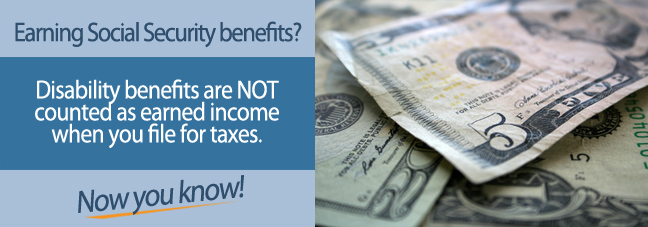If you’re disabled, you may receive Social Security benefits in the form of payments every month. When it comes to taxes, what is considered income can get a little tricky.
The Social Security administration has outlined what does and doesn’t count as earned income for tax purposes. While the answer is NO, disability benefits are not considered earned income, it’s important to know the difference between earned and unearned income and know where your benefits fit in during tax season.
What is Earned Income?
Earned income is money you made working, either for an employer or for yourself if you’re an entrepreneur or independent contractor. This includes wages, salaries, and tips. Less obvious money that is also considered earned income consists of union strike benefits and net earnings from self-employment. Most earned income is taxable with only a few exceptions.
What is Unearned Income?
Unearned income is money that comes to you not as a result of employment. Examples of unearned income are:
- Social Security disability benefits
- Interest and dividends
- Retirement income
- Unemployment
- Alimony
- Child support
- Pay for work done while in prison
When filing your taxes, you will need to report your unearned income, separating it from your earned income. There are several places on your tax form meant to designate which income is earned and unearned.
Since Disability Benefits are Unearned Income, are They Taxed?
Your other income besides disability payments determines if your disability benefits are taxed or not. Your benefits are considered together with income from taxable disability plans, investments, and pensions by the IRS. In 2016, a single person may make up to $25,000 a year without being taxed on disability benefits, and a couple may make up to $32,000 a year without any disability benefits being taxed.
Does it Matter if my Benefits Come From SSI or SSDI?
Yes. If you are disabled and receiving SSI (Supplemental Security Income) benefits, you are already established as belonging in the low-income tier, and you probably won’t be taxed on ANY of your income. If you are receiving SSDI (Social Security Disability Insurance) benefits, and you have significant income from other sources, then you can be taxed on up to half of your SSDI benefits.
Further Reading: What Is SSI?
This makes sense because SSDI payments are entitlements with no income limits to qualify, while people whose income is low enough to qualify for SSI payments already don’t have enough income to pay taxes.
Disability Benefits and the EITC
The Earned Income Tax Credit is a refundable tax credit for low-income working (earning) families and individuals. Since the IRS is clear that disability benefits are not considered earned income, these benefits can’t be used to claim this credit. You must have worked and made an income to get this tax credit.
It can be difficult to navigate both Social Security administration rules in conjunction with IRS tax laws alone. It would be beneficial to hire a disability lawyer to help make sure you’ve received the benefits you’re entitled to, as well as report the right amounts of earned and unearned income.
